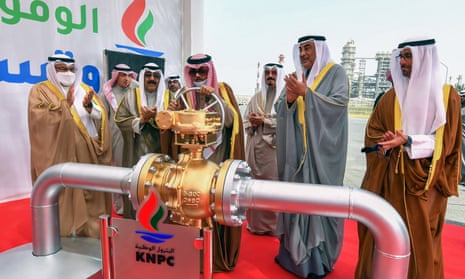The British government has provided more than £5bn in the past three years to overseas energy and infrastructure projects linked to labour abuses and environmental damage, according to documents and interviews with workers.
The funding – a combination of loans and guarantees – comes from the government’s export credit agency, UK Export Finance (UKEF), a government department to help UK companies access business contracts overseas.
Since 2019, UKEF has allocated £5.24bn of taxpayer money to projects with the potential to cause “significant adverse environmental and/or social impacts” in countries across the Middle East, Africa and Asia, according to calculations by the Guardian based on disclosures by the agency.
Oil refineries, power stations, and a large-scale liquified natural gas (LGN) project are among the high-risk “Category A projects”, to receive funding recently.
UKEF undertook environmental and human rights reviews of the projects ahead of granting the funding. Despite recommendations to mitigate labour abuses, six migrant workers employed on Middle Eastern projects backed by UKEF have revealed low pay, safety hazards, excessive working hours, and the denial of freedom of movement as persistent issues.
“UKEF financing is very specific and usually funds very big, very damaging infrastructure projects,” said Daniel Willis, policy and campaigns manager at campaign group Global Justice Now. “Human rights considerations are an afterthought, and due diligence seems to be approached as if it is just a box to tick.”
A review of an oil refinery upgrade programme in Kuwait, obtained by a freedom of information request, shows that UKEF knew of worker issues before it provided a $179m (£135m) support package in 2019. Employees and contractors were commonly working more than the maximum overtime hours allowed by legislation, and 87% of workers surveyed had not received an employment contract, according to the UKEF’s review.
About 90% of workers at Kuwait National Petroleum Company (KNPC) had also been charged illicit recruitment fees to secure their jobs. Some were living in sub-standard accommodation with no air-conditioning, despite summer temperatures reaching 54C in Kuwait, the review said.
Gulam Siddique, 30, from India, who recently worked as an inspector at KNPC’s refineries, told the Guardian lower-skilled labourers were not treated well.
“They are treated as slaves, working 12 hours a day in direct sunlight,” said Siddique. “There are health risks for those guys, from the gases released at the plant.”
Several of the UK-backed projects are based in Middle Eastern countries, where the labourers’ freedom of movement is controlled under the kafala sponsorship system, which has been deemed abusive and exploitative by Human Rights Watch.
Aditya*, 35, said he has been unable to leave his job in Oman. His employer is a sub-contractor involved in the construction of the country’s Duqm oil refinery project. Aditya said he worked 11-hour days, for $1.90 (£1.45) an hour. The Duqm oil refinery received £700m of UK funds in 2019.
“The company has taken my passport,” said Aditya, also from India. “The accommodation is not comfortable. Five people sleep in one small room. Companies here are not giving good facilities to their workers.”
Before awarding it $500m in 2019, a UKEF review flagged the Bahrain Petroleum Company (Bapco) oil refinery expansion project as having “forced and child labour and worker health and safety as potential project risks”.

Rajesh*, who works at the Bapco refinery, said he was paid the equivalent of $2.50 (£1.90) an hour, not enough to support his wife and two young daughters back in India, he said. “The salary is not fair. I need more overtime because of my family,” he said.
The dormitory accommodation provided by his company does not have functioning air conditioning, leaving him sweltering in the summer months. The protective clothing and equipment provided does not work properly, he added.
“None of us wants to speak up and say it’s hazardous,” he said. “We are too afraid.”
The UK government was recently sued by the environmental group Friends of the Earth (FoE) for providing $1.15bn to an LNG project in Cabo Delgado province, Mozambique, which it claims contravenes the Paris climate agreement.
On 15 March, two high court judges issued a split decision over the funding, and the case will now go to appeal.
The project “could emit up to 4.5bn tonnes of climate-wrecking greenhouse gases over its lifetime, more than the combined annual emissions of all 27 EU countries”, FoE stated. “Estimates suggest the construction phase of this project alone would increase Mozambique’s emissions by up to 10% by 2022.”
The project has been embroiled in human rights issues. TotalEnergies, the major shareholder, has ordered the displacement of thousands of people from fishing and farming communities around the site, to a relocation village 10km inland. This has left them without livelihoods and insufficiently compensated, according to FoE.
In April, TotalEnergies abandoned its work on the project after a violent uprising in the region – several months before the UKEF support package was finalised in August. However, the French firm has said it expects work to resume at some point in 2022.
TotalEnergies, KNPC, Bapco and OQ – the developer of the Duqm refinery – did not respond to requests for comment.
A UKEF spokesperson said: “We are aware of the issues recently highlighted to us regarding workers’ rights on these projects and are taking them extremely seriously.
“We undertake thorough reviews to ensure the management of environmental and social impacts and risks, including those associated with worker welfare, meet international industry standards following the provision of our support. No aspect of our commercial relationship with any company prevents us from taking action so that these standards are met for the duration of our support.”
* Names changed to protect identities
